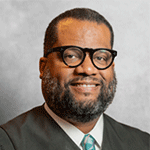Agenda
Day 1
March 31, 2025
Registration & Continental Breakfast
Co-Chairs Opening Remarks
YEAR IN REVIEW
Analyzing ITC Developments: Section 337 Filings and Appeals – The Notable Investigations, Consequential Decisions, and Policy Considerations

Michael ConnellyPresidentWIT Legal

Christina A. OndrickPartnerSpencer Fane

Kecia ReynoldsPartner, Litigation DepartmentPaul Hastings LLP
Join us as we discuss key developments at the ITC over the last twelve months, and forecast refinements to anticipate in 2025. We will also look at potential changes at the Federal Circuit and explore other notable considerations, such as:
- Recent ITC rulings on Standard Essential Patents
- Effectiveness of the ITC when medical use products are to be considered
- New industries that are turning to the ITC for relief
- Developments affecting ITC practice preparation and procedure
- Changes and trends in the numbers of investigations that are instituted, settled, resolved with exclusion orders, appealed and reversed on appeal
- New trade policies under the Trump Administration that may influence the ITC

Honorable Doris Johnson HinesAdministrative Law JudgeU.S. International Trade Commission

Wilhelm L. RaoShareholderMcAndrews, Held & Malloy, Ltd.
Be sure to join us in this session as our panel of ALJs provide us with insights from the Bench, including the ins and outs of 337 practice, differences between the ITC, Federal District Court, and other litigation forums and agencies.
Extended Networking Break
Public Interest Considerations In 337 Investigations and Decisions: Examining the Effect of Relief on the “Public Health and Welfare”

Jennifer CieluchCounselAlston & Bird LLP

Ryan HerringtonSenior Managing DirectorFTI Consulting

Joshua J. NewcomerPrincipalMcKool Smith
Leaders of corporate IP departments may be tempted to neglect the public interest argument in an ITC investigation, considering that the ITC has only issued remedial orders due to public interest concerns in just three investigations. However, while the grant or denial of exclusionary relief in a Section 337 case rarely turns solely on public interest factors, the Commission and ALJs do take them into consideration.
In this session our panelists will assess the impact of public interest factors in ITC investigations and provide insights on:
- Factors that could lead the ITC to delay a remedial order
- Scenarios where products are “grandfathered” to prevent disruption to customers that already have violative products in the United States
- Facts that have historically satisfied the public interest prongs
- How remedies have been used to tailor exclusion orders
- Recent cases that involve public interest considerations, such as Apple v. Masimo and Certain Microfluidic Devices

Brian JohnsonPartnerAxinn, Veltrop & Harkrider LLP

Teresa SummersPartnerSummers Law Group LLP

Mitch VerboncoeurPrincipalMcKool Smith
Standard Essential Patent (SEP) policies continue to evolve, with recent policy statements providing inconsistent guidance on whether — and when — SEP owners should obtain injunctive relief against prospective licensees. The Trump Administration issued a policy statement asserting that injunctive relief and exclusion orders from the ITC should be “equally available” for SEP owners, but the Biden Administration withdrew this policy statement.
Despite this injunction-related uncertainty in US litigation, recent high-profile cases indicate that the ITC remains an attractive forum for SEP owners. In this session we will examine the approach and strategic role of the ITC in SEP litigation. Topics of discussion include:
- The willingness of US District Courts to issue injunctions in patent cases
- The need to be prepared to point to public interest concerns based on SEP owners’ FRAND (fair, reasonable, and nondiscriminatory) Commitments
- Analyzing recent SEP case developments and understanding recent policy statement
- The effects of the fast-paced and frequently expensive discovery
- The prospects for future exclusion orders on SEPs
Networking Luncheon

Marc CavanDirectorLongford Capital Management, LP

Joshua HarrisDirectorBurford Capital New York

Jonathan StroudGeneral CounselUnified Patents
Third party litigation funding (TPLF) for 337 matters is on the rise and is the subject of increased discussion and scrutiny. The increase in TPLF has also created challenges for practitioners and Judges and raises concerns about corrupting the legal system by prioritizing profit over public interest. In this session we will examine:
- Judicial efforts to disclose TPLF agreements in the discovery phase
- Policymaker proposals and legislation aimed at increasing transparency and addressing concerns about foreign involvement in United States legal proceedings
- The potential for conflicts of interest and weakening of attorney-client privilege that can be created by TPLF
- Inappropriate influence on case strategies, settlement decisions, and other crucial elements that can undermine the integrity of legal advocacy
Networking Break

Matthew BathonPrincipal Legal Counsel II, Legal Management Samsung Electronics

Megan S. WoodworthPartnerVenable LLP

Shawnna YasharDirector of Global IP Litigation & IP EnforcementLenovo
Litigation in the ITC is fast and highly technical and requires a specialized knowledge of the forum. Respondents are often at a significant disadvantage at the beginning of an investigation because the complainant has had months to prepare its case. As such, it is critical to work productively within the condensed timeframe of ITC Proceedings to optimize the outcome.
In this informative and interactive session our panel of in-house counsel will examine effective strategies for managing these proceedings, such as:
- Managing the relationships between in-house and outside counsel
- Exploring scenarios that justify a cease-and-desist order
- Learning how to work productively within the timeframe of a 337 investigation to optimize your outcome
- Identifying and Filing Strategic Motions for Summary Determination
End of Day One / Networking Cocktail Reception
Day 2
April 1, 2025
Registration & Continental Breakfast
Co-Chairs’ Opening Remarks
Navigating Parallel Proceedings and Concurrent Investigations: Strategies for Maneuvering Through the ITC, PTAB and District Courts

Honorable Bryan F. MooreAdministrative Law JudgeUS International Trade Commission

Reginald David LucasCounselGroombridge, Wu, Baughman & Stone LLP

Michael R. FranzingerPartnerDentons
The Commission and its ALJs have long had the authority to stay an investigation under “appropriate circumstances,” including those involving Patent Office proceedings. In addition, the ITC favors speed and demands certainty before crediting PTAB invalidity rulings.
The “need for speed” can have its drawbacks however, particularly when addressing complicated issues of patent validity. When a PTAB final written decision becomes available before the Commission issues its Final Determination, the PTAB invalidity ruling could meaningfully assist the ITC in accurately carrying out its mandate. Join us in this session as we examine:
- Parallel records before the agency, corresponding motions to stay, and pitfalls to avoid
- Recent case law and developments on discretionary denials
- Guidelines to work within the timelines of an ITC proceeding alongside a concurrent PTAB action
- The interplay between ITC and PTAB and how they are intersecting at an increasing pace
Networking Break

Dax TerrillChief, Exclusion Order Enforcement Branch Regulations and Rulings – Office of TradeU.S. Customs and Border Protection (CBP)

Helena KiepuraPartnerDLA Piper LLP

Jordan CoylePartnerWhite & Case LLP
After a difficult and costly ITC investigation leads to an exclusion order, both the patent owner and accused patent infringer may think that the matter is finally over. However, the parties’ dispute will likely move to a new forum: the U.S. Bureau of Customs and Border Patrol. Once the exclusion order issues, there are specific guidelines that Customs puts in place to identify infringing goods and enforce the order.
Join us in this session as we examine the variety of options available to parties after an exclusion order issues, such as:
- Certification to CBP that goods may not be subject to the exclusion order
- Pursuit a Rule 177 ruling – for goods that are beyond the scope of the ITC exclusion order
- Importing a redesigned good “at-risk” and file a protest challenging exclusion of the good
- Petitions to obtain advisory opinions or modifications of the order
- Attempts to secure additional remedial orders and civil penalties
Networking Luncheon

Scott P. McBrideShareholderMcAndrews, Held & Malloy, Ltd.

Daniel F. SmithShareholderPolsinelli

Kiran K. PatelSenior IP CounselPhilips
The landmark Loper Bright decision marks the end of Chevron deference, the doctrine of deferring to an agency’s interpretation of allegedly ambiguous statutory language. This ruling will increase the opportunities for regulated industries to challenge agency rules, including in proceedings before the Patent Trial and Appeal Board (PTAB) and the International Trade Commission (ITC). It also calls into question the powers courts will have to make judgments in the fields of science and tech (including A.I.).
Join us for this critical and interactive session as we delve into the far-reaching implications of this ruling. Topics of discussion will include:
- Understanding how the decision will affect Section 337 Filings and Appeals
- Examining the new legal landscape and its demand on outside counsel
- Predicting the potential for new and renewed legal challenges to longstanding federal regulations
- Analyzing the likelihood and scope of increased ITC litigation as a result of the ruling
Networking Break

Jorge L. ContrerasJames T. Jensen Endowed Professor for Transactional Law and Director of the Program on Intellectual Property and Technology LawUniversity of Utah, S.J. Quinney College of Law

Jay GagenPartner, Litigation DepartmentPaul Hastings, LLP

Veronica AscarrunzPartner, Firmwide Co-Chair, ITC Litigation PracticePerkins Coie LLP
Immediate Past President, ITC TLA
The ITC quickly investigates whether imports are harming U.S. businesses or violating intellectual property rights and can also determine if there has been trade secret misappropriation. After such investigations and examinations, the ITC can impose robust exclusion orders barring the importation of foreign-manufactured goods into the U.S.
However, critics feel that the ITC undertakes an analysis of asserted patents that are often in parallel with district courts adjudicating the same disputes, with no estoppel. There are some that feel the ITC’s authority to issue exclusion orders enforced by Customs and Border Protection could be handed over to federal courts, as could the ITC’s in rem jurisdiction over infringing articles.
Join us for an exciting and interactive debate, where our panelists will determine when – and under what circumstances – the ITC should gain jurisdiction over IP disputes.
ITC Town Hall and Wine Toast
Illuminating the Scope of the Domestic Industry Requirement: Examining the New and Proposed Revisions and Their Effect on Future ITC Practice

Barbara A. MurphyFounding PartnerFoster, Murphy, Altman & Nickel, PC

Drew D. MooneySenior Managing DirectorFTI Consulting, Inc.

Matthew A. KarambelasMemberMintz, Levin, Cohn, Ferris, Glovsky and Popeo, P.C.
To access the ITC, Section 337 requires a complainant to show that it maintains the required level of economic activity within the United States, and prove that this economic activity is devoted to exploiting the intellectual property right at issue. To adequately satisfy these requirements, complainants must show that they belong to a “domestic industry” that needs protection.
Be sure to join us in this closing session as we look at recent decisions and the effects of proposed revisions to these requirements.
Topics for discussion include:
- Takeaways from recent Federal Circuit decisions (Wuhan v. ITC and Lashify v. ITC)
- Potential impacts to the status of the ITC’s “mere importer” test
- Insights into “significance” and “substantiality” requirements
- Increasing role of domestic industry economic prong in ITC cases


